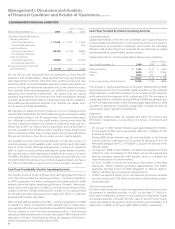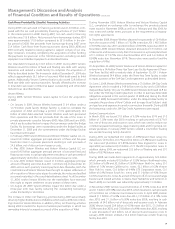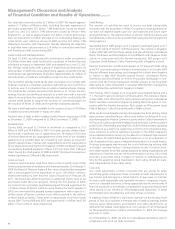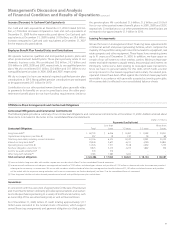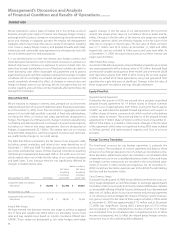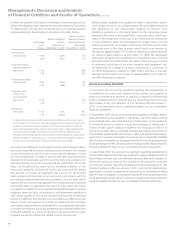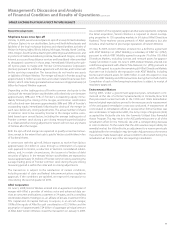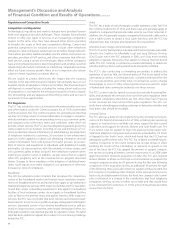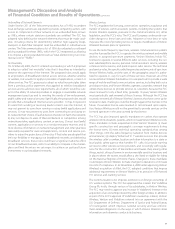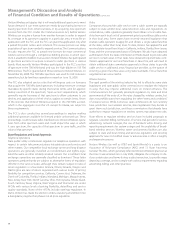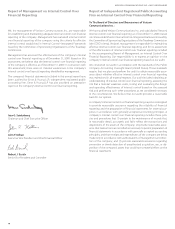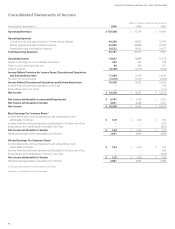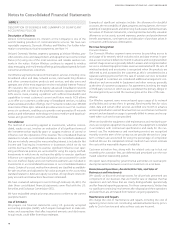Verizon Wireless 2009 Annual Report Download - page 39
Download and view the complete annual report
Please find page 39 of the 2009 Verizon Wireless annual report below. You can navigate through the pages in the report by either clicking on the pages listed below, or by using the keyword search tool below to find specific information within the annual report.37
Unbundling of Network Elements
Under Section 251 of the Telecommunications Act of 1996, incumbent
local exchange carriers are required to provide competing carriers with
access to components of their network on an unbundled basis, known
as UNEs, where certain statutory standards are satisfied. The FCC has
adopted rules defining the network elements that must be made avail-
able, including criteria for determining whether high-capacity loops,
transport or dark fiber transport must be unbundled in individual wire
centers. The Telecommunications Act of 1996 also adopted a cost-based
pricing standard for these UNEs, which the FCC interpreted as allowing
it to impose a pricing standard known as “total element long run incre-
mental cost” or “TELRIC.”
Net Neutrality
On October 22, 2009, the FCC initiated a proceeding in which it proposes
to adopt so-called “net neutrality” rules that it describes as intended to
preserve the openness of the Internet. The proposed rules would apply
to all providers of broadband Internet access services, whether wireline
or wireless, but would not apply to providers of applications, content or
other services. The FCC proposes to adopt as rules four principles taken
from a previous policy statement that applied to wireline broadband
services and to add two new requirements, all of which would be sub-
ject to the ability of network providers to engage in reasonable network
management practices and to meeting the needs of law enforcement,
public safety and national security. Specifically, the proposed rules would
provide that a broadband Internet access provider: 1) may not prevent
its users from sending or receiving lawful content over the Internet; 2)
may not prevent its users from running or using lawful applications and
services; 3) may not prevent its users from connecting to and using on
its networks their choice of lawful devices that do not harm the network;
4) may not deprive its users of their entitlement to competition among
network providers, applications, content or services; 5) must treat lawful
content, applications or services in a nondiscriminatory manner; and 6)
must disclose information on network management and other practices
reasonably required for users and application, content and service pro-
viders to enjoy the protections of the rules. If final rules are adopted that
limit our flexibility in managing our broadband networks and delivering
broadband services, these rules could have a significant adverse effect
on our broadband business, restrict our ability to compete in the market-
place and limit the return we can expect to achieve on past and future
investments in our broadband networks.
Management’s Discussion and Analysis
of Financial Condition and Results of Operations continued
Wireless Services
The FCC regulates the licensing, construction, operation, acquisition and
transfer of wireless communications systems, including the systems that
Verizon Wireless operates, pursuant to the Communications Act, other
legislation, and the FCC’s rules. The FCC and Congress continuously con-
sider changes to these laws and rules. Adoption of new laws or rules
may raise the cost of providing service or require modification of Verizon
Wireless’s business plans or operations.
To use the radio frequency spectrum, wireless communications systems
must be licensed by the FCC to operate the wireless network and mobile
devices in assigned spectrum segments. Verizon Wireless holds FCC
licenses to operate in several different radio services, including the cel-
lular radiotelephone service, personal communications service, wireless
communications service, and point-to-point radio service. The technical
and service rules, the specific radio frequencies and amounts of spectrum
Verizon Wireless holds, and the sizes of the geographic areas it is autho-
rized to operate in, vary for each of these services. However, all of the
licenses Verizon Wireless holds allow it to use spectrum to provide a wide
range of mobile and fixed communications services, including both voice
and data services, and Verizon Wireless operates a seamless network that
utilizes those licenses to provide services to customers. Because the FCC
issues licenses for only a fixed time, generally 10 years, Verizon Wireless
must periodically seek renewal of those licenses. Although the FCC has
routinely renewed all of Verizon Wireless’s licenses that have come up for
renewal to date, challenges could be brought against the licenses in the
future. If a wireless license were revoked or not renewed upon expira-
tion, Verizon Wireless would not be permitted to provide services on the
licensed spectrum in the area covered by that license.
The FCC has also imposed specific mandates on carriers that operate
wireless communications systems, which increase Verizon Wireless’s costs.
These mandates include requirements that Verizon Wireless: (i) meet
specific construction and geographic coverage requirements during
the license term; (ii) meet technical operating standards that, among
other things, limit the radio frequency radiation from mobile devices
and antennas; (iii) deploy “Enhanced 911” wireless services that provide
the wireless caller’s number, location and other information to a state or
local public safety agency that handles 911 calls; (iv) provide roaming
services to other wireless service providers; and (v) comply with regula-
tions for the construction of transmitters and towers that, among other
things, restrict siting of towers in environmentally sensitive locations and
in places where the towers would affect a site listed or eligible for listing
on the National Register of Historic Places. Changes to these mandates
could require Verizon Wireless to make changes to operations or increase
its costs of compliance. In its November 4, 2008 order approving Verizon
Wireless’s acquisition of Alltel, the FCC adopted conditions that impose
additional requirements on Verizon Wireless in its provision of Enhanced
911 services and roaming services.
The Communications Act imposes restrictions on foreign ownership of
U.S. wireless systems. The FCC has approved the interest that Vodafone
Group Plc holds, through various of its subsidiaries, in Verizon Wireless.
The FCC may need to approve any increase in Vodafone’s interest or the
acquisition of an ownership interest by other foreign entities. In addition,
as part of the FCC’s approval of Vodafone’s ownership interest, Verizon
Wireless, Verizon and Vodafone entered into an agreement with the
U.S. Department of Defense, Department of Justice and Federal Bureau
of Investigation which imposes national security and law enforce-
ment-related obligations on the ways in which Verizon Wireless stores
information and otherwise conducts its business.



